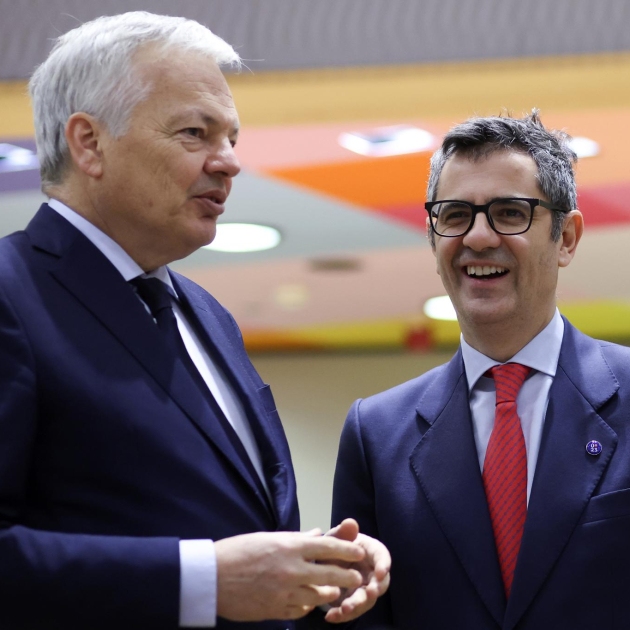The European Commission's justice commissioner, Didier Reynders, has stated this Monday that Spain's inability to renew its judicial governance organ, the CGPJ, is a "concern" for Brussels - unlike the Catalan amnesty law. He made this distinction between the two issues in a joint press conference with the Spanish presidency and justice minister, Félix Bolaños, after the politicians met this Monday. Reynders insisted that it is necessary to be patient and not expect a positioning from the Commission on the amnesty until the legislation has been passed by the Spanish houses of parliament. Bolaños, for his part, affirmed that there is a "common position" between Madrid and Brussels to maintain a "dialogue" around the amnesty law. However, he has made the subtle shift from insisting that the European Commission has "zero concerns" about the proposed law to admitting that it has "questions".
The Spanish minister pointed out, specifically, that there is an "aligned position" between the Spanish government and the European Commission when it comes to responding to "questions" from the EU executive relating to the bill law that seeks to wipe the slate clean for those accused of Catalan independence process offences. Both officials agreed that their communication on the issue is good. Reynders, in fact, said that he has "good" dialogue with Bolaños. But he reiterated on several occasions that no assessment of the amnesty should be expected from the EU Commission until the law appears in the Spanish official gazette.
This Monday's joint press conference came less than a week after Bolaños and Reynders had entered into a battle of nuances: the Spanish Socialist politician summed up, after the two had met, that in Brussels there is "zero concern" for the "separation of powers and the rule of law in Spain". The European Commission later made the small correction that this position has nothing to do with the amnesty, and that they have to keep an eye on the planned legislation. "Reynders has not said for now that the amnesty law does not raise concerns", pointed out the commissioner's spokesperson. And the Spaniard then later reiterated what he had said "word for word": he had been careful, and he had not made a direct reference to the amnesty, but to the democratic quality of the Spanish state. This Monday, however, he acknowledged that Brussels has "questions".
The blockade of the CGPJ, more concerning than the amnesty
The fact is that the prudence and calm that Reynders prescribed this Monday with regard to the amnesty was not maintained - not at all - when he addressed the issue of Spain's General Council of the Judiciary (CGPJ), the organ of judicial governance whose mandate expired five years ago. He admits that this fact is a "concern" in Brussels, and re-stated that it is a "priority" for the European Commission that the body be renewed.
Although Reynders showed himself open to studying any proposed solution that might be the result of a PSOE-PP pact, he pointed out that the first priority must be to renew the CGPJ and, in any case, to reform the judiciary later. "I know from experience that a reform takes longer than a mere renovation," he pointed out. This is exactly the opposite of what the PP demands.
